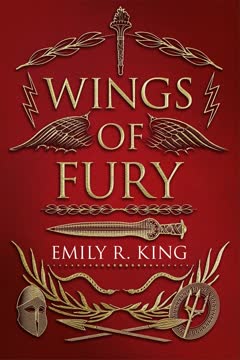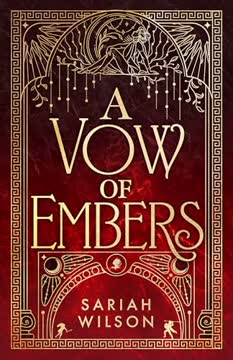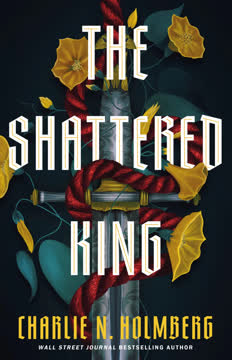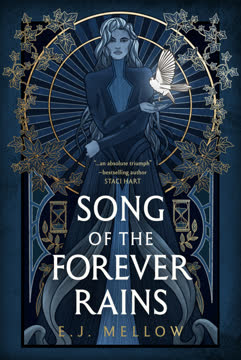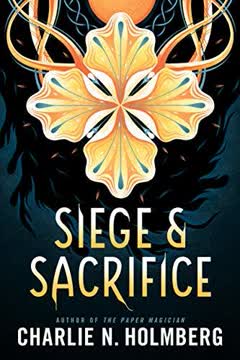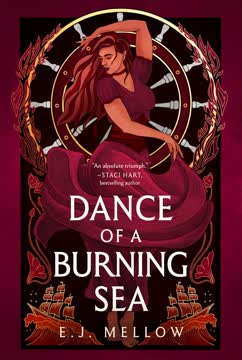Plot Summary
Sisters in the Shadows
Althea (Hera), Cleora (Hestia), and Bronte (Demeter), daughters of a mortal woman, Stavra Lambros, live in a world ruled by the tyrannical Titan Cronus (The Almighty). Their lives are shaped by fear, secrecy, and the ever-present threat of violence from men like Decimus, a brutal general who marks Althea (Hera) as his future prize. When their mother is taken by Cronus (The Almighty)'s men, the sisters are forced to hide, clinging to each other and the vestal temple that offers only the illusion of safety. The bond between them is fierce, forged in adversity, and their love for one another becomes both shield and burden as they navigate a world that values women only as possessions or sacrifices.
The Night of Loss
Stavra Lambros returns, broken and pregnant with Cronus (The Almighty)'s child, only to die giving birth to a half-Titan baby girl. In the chaos, Althea (Hera) is forced to choose between vengeance and mercy, nearly casting the newborn from a window before recognizing her as kin. Soldiers arrive to claim the infant, tearing her from Althea (Hera)'s arms. In the aftermath, Althea (Hera) swears to her dying mother that she will protect her sisters at all costs. This promise, made in grief and rage, becomes the axis of her life, binding her to a path of sacrifice and impossible choices, even as the world continues to take from her.
Oaths and Oracles
Years pass in the temple, where the sisters toil under the harsh matron Prosymna. Althea (Hera), restless and rebellious, is marked by Decimus and haunted by the memory of her lost baby sister. When Cleora (Hestia), desperate for safety, nearly scars her own face to avoid Cronus (The Almighty)'s attention, Althea (Hera) realizes the depth of their fear. Seeking hope, she visits an oracle, who reveals a prophecy: a hidden son of Cronus (The Almighty), the Boy God, will one day overthrow the tyrant. Althea (Hera) is told her fate is entwined with his, and that her choices will determine the future of gods and mortals alike.
The Mark of Decimus
Althea (Hera)'s life is further complicated by the curse of Decimus, who brands her as his property. The mark is more than physical; it is a magical tether that burns whenever he desires her, threatening to override her will. This curse becomes a symbol of the world's oppression, a constant reminder of the violence and control men wield over women. Althea (Hera)'s struggle against it is both literal and metaphorical, as she fights to retain her agency and protect her sisters from a fate like her mother's.
A World Ruled by Fear
The sisters dream of freedom, pooling their meager resources to buy a boat and plotting to flee to the southern isles, where Oceanus's lawless domain offers hope of sanctuary. Their plans are threatened by the ever-present danger of Decimus and the tightening grip of Cronus (The Almighty)'s regime. When Decimus returns, violence erupts, and Cleora (Hestia) is taken as a captive to the palace. Althea (Hera) and Bronte (Demeter) are forced to flee, their family shattered once again. The world's cruelty is laid bare, but so too is the sisters' resilience and determination to reclaim their fate.
The Boat to Freedom
With the help of Theo Angelos, a soldier with a mysterious past and a conscience, Althea (Hera) and Bronte (Demeter) escape by sea. The journey is perilous, marked by storms, sea monsters, and the ever-present threat of pursuit. Theo Angelos's motives are unclear—he claims to have been sent by the oracles, and his acts of kindness begin to earn Althea (Hera)'s trust. As they sail toward Crete, the sisters confront their fears, their grief, and the possibility that destiny may demand even greater sacrifices.
The Boy God's Cave
On Crete, Althea (Hera) and Bronte (Demeter) discover a hidden tribe of women and the Boy God, Zeus (The Boy God), who is nothing like the hero they expected. Spoiled, self-absorbed, and reluctant to embrace his fate, Zeus (The Boy God) resists their pleas for help. The sisters' frustration grows as they realize that the prophecy alone is not enough—Zeus (The Boy God) must choose to rise, and the world will not change unless those with power are willing to fight for it. The burden of destiny weighs heavily, and Althea (Hera) is forced to confront her own doubts about fate, agency, and the cost of hope.
The Island of Women
The tribe on Crete is a haven for women who have fled the violence of men, but it is also a place of pain. Many have ritually scarred their faces to protect themselves from abduction, a practice both empowering and tragic. Althea (Hera) learns that her mother and father once helped smuggle women to safety, and that the tribe's leader, Adrasteia & Ida, was her mother's ally. The island's peace is fragile, threatened by betrayal from within and the ever-looming shadow of Cronus (The Almighty)'s wrath. The sisters find kinship and healing, but also the limits of isolation and the need to confront the world beyond.
The Prophecy's Burden
With Theo Angelos's help, Zeus (The Boy God) begins to train, slowly embracing his Titan strength and the responsibility of his birthright. The process is fraught with setbacks, self-doubt, and the ever-present risk of failure. Althea (Hera)'s relationship with Theo Angelos deepens, complicated by secrets, guilt, and the knowledge that love is both a comfort and a vulnerability. The sisters, now joined by the tribe's warriors, prepare for the coming conflict, knowing that prophecy alone will not save them—action, courage, and unity are required.
The Star Eater's Shadow
As Althea (Hera)'s power grows, she is haunted by visions of the Star Eater, Uranus, the primordial sky god imprisoned by Cronus (The Almighty). The Star Eater tempts her with promises of power and vengeance, offering to help her destroy Cronus (The Almighty) if she will set him free. The line between justice and destruction blurs, and Althea (Hera) must decide whether to trust the old gods or forge her own path. The Erinyes, goddesses of vengeance, hound her for her broken oaths, demanding atonement and threatening to drag her to Tartarus if she fails.
The Price of Memory
Captured and brought to the palace, Althea (Hera) and her sisters are subjected to the manipulations of Mnemosyne, the goddess of memory, who alters their minds to make them loyal to Cronus (The Almighty). Cleora (Hestia) and Bronte (Demeter) are seduced by false memories and promises of safety, while Althea (Hera) fights to retain her sense of self. The revelation that their true mother is Rhea, and that Stavra Lambros was only their foster mother, shakes the foundation of their identities. The cost of survival is the loss of memory, agency, and the truth of who they are.
The Wings Within
With the help of Metis, Zeus (The Boy God)'s betrothed and a prophetess, Althea (Hera) obtains a magical draught that will weaken Cronus (The Almighty). In a climactic confrontation, she and her sisters reclaim their Titan strength, their true names—Hestia, Demeter, and Hera—and the wings that symbolize their souls. The battle is fierce, with Cronus (The Almighty) wielding the adamant sickle and the sisters, joined by Zeus (The Boy God) and Theo Angelos, fighting not just for themselves but for the future of gods and mortals. The power of love, memory, and sisterhood proves stronger than tyranny.
The Fall of Cronus
Cronus (The Almighty) is defeated in a battle that spans earth and sky, his power undone by the very children he sought to control. The sisters, now fully realized as goddesses, refuse to become what he was, choosing instead to forge a new path. The Erinyes are appeased, Theo Angelos's true heritage as the son of Prometheus is revealed, and the world is forever changed. The palace crumbles, the old order falls, and the promise of a new constellation—a new way of being—emerges.
The Shape of a Soul
In the aftermath, Althea (Hera) reflects on the meaning of power, the legacy of her mothers—both mortal and divine—and the importance of choosing one's own path. The sisters, now Hestia, Demeter, and Hera, embrace their new roles with humility and hope, determined to use their strength to protect rather than dominate. The bonds of family, forged in suffering and love, become the foundation of a new world. The story ends not with triumph, but with the promise of growth, healing, and the ongoing struggle for justice.
The Lioness Ascends
Althea (Hera), once a frightened girl hiding in the shadows, has become a lioness with wings—a symbol of courage, independence, and the refusal to be defined by others. Her journey is one of self-discovery, sacrifice, and the reclamation of agency in a world that sought to strip it away. The lessons of her mothers, the trials of prophecy, and the love of her sisters shape her into a leader, a goddess, and a beacon for those who come after. The constellation of sisters shines anew, lighting the way for a future where no one is left behind.
The Bonds of Sisterhood
The sisters, reunited at last, find peace not in victory but in each other. The wounds of the past remain, but they are no longer defined by them. Together, they honor the memory of Stavra Lambros, the sacrifices of their parents, and the promise of a world where women are more than possessions or pawns. The story closes with the sisters flying together, their wings a testament to the power of love, resilience, and the unbreakable bonds of family.
The New Constellation
With Cronus (The Almighty) defeated and the old order shattered, the sisters look to the future. They are no longer bound by prophecy, memory, or the expectations of others. Their constellation—once fractured by loss and betrayal—is whole again, shining brightly in the night sky. The world is changed, but the struggle for justice, agency, and love continues. The story ends with the promise that, as long as sisters stand together, no darkness can extinguish their light.
Characters
Althea (Hera)
Althea is the youngest of the three sisters, defined by her restless spirit, fierce loyalty, and refusal to accept the world's injustices. Marked by Decimus and haunted by the loss of her mother and baby sister, she is driven by a vow to protect her family at all costs. Althea's journey is one of self-discovery, as she grapples with the burden of prophecy, the trauma of violence, and the struggle for agency in a world that seeks to control her. Her relationship with Theo Angelos is fraught with mistrust and longing, and her eventual awakening as the goddess Hera is both a fulfillment of destiny and a reclamation of self. Althea's greatest strength is her capacity for love, which becomes the source of her power and the key to her transformation.
Cleora (Hestia)
Cleora, the eldest sister, is the anchor of the family, embodying patience, order, and quiet strength. Traumatized by her mother's fate, she seeks safety in ritual and routine, even considering self-mutilation to avoid Cronus (The Almighty)'s attention. Her devotion to her sisters is unwavering, but her fear often leads her to seek refuge in submission and conformity. When her memory is altered by Mnemosyne, Cleora becomes a symbol of the dangers of forgetting one's true self. Her eventual reclamation of her identity and power as Hestia is a testament to the resilience of the human (and divine) spirit, and her role as the hearth-keeper is reimagined as one of agency and choice.
Bronte (Demeter)
Bronte, the middle sister, is practical, philosophical, and deeply connected to the earth. She finds solace in gardening, music, and debate, and her wit often serves as both shield and sword. Bronte's skepticism about prophecy and fate grounds her sisters, but she is also the first to act when danger threatens. Her journey is one of balancing hope and realism, and her transformation into Demeter, goddess of the harvest, is both literal and symbolic. Bronte's scars—physical and emotional—are reminders of the world's cruelty, but also of her capacity to heal and nurture.
Theo Angelos
Theo is a complex figure, torn between duty and conscience. Marked by his service to Cronus (The Almighty) and his complicity in the sisters' suffering, he seeks redemption through acts of kindness and courage. His true heritage as the son of Prometheus is revealed late, adding layers to his struggle with fate, loyalty, and love. Theo's relationship with Althea (Hera) is marked by mutual suspicion, longing, and the shared burden of impossible choices. His journey is one of atonement, as he risks everything to help the sisters and the Boy God, ultimately finding his own place in the new order.
Zeus (The Boy God)
Zeus is the prophesied son of Cronus (The Almighty), hidden away on Crete and raised in isolation. Spoiled, self-absorbed, and initially unwilling to embrace his destiny, he is a disappointment to those who seek a savior. Through the efforts of Althea (Hera), Bronte (Demeter), and Theo Angelos, Zeus gradually awakens to his power and responsibility, transforming from a boy into a god. His journey is one of growth, humility, and the realization that true strength lies in service, not domination. Zeus's eventual rise is both a fulfillment of prophecy and a challenge to the old order.
Stavra Lambros
Stavra is the sisters' foster mother, a woman of extraordinary courage and compassion. Her life is marked by suffering—abduction, rape, and death in childbirth—but also by acts of resistance, as she helps smuggle women to safety and instills in her daughters the values of love, loyalty, and defiance. Stavra's memory is manipulated by Cronus (The Almighty), but her legacy endures in the hearts of her daughters. She is both a victim and a hero, her story a testament to the power of ordinary women in extraordinary times.
Decimus
Decimus is the primary antagonist among mortals, a man who wields power through violence, fear, and magical coercion. His obsession with Althea (Hera) is both personal and symbolic, representing the world's desire to possess and control women. Decimus's curse on Althea (Hera) is a literalization of the ways in which men claim ownership over women's bodies and destinies. His eventual downfall is both justice and warning, a reminder that tyranny breeds its own destruction.
Cronus (The Almighty)
Cronus is the ruler of the Titans, a being of immense power, paranoia, and cruelty. Obsessed with maintaining his throne, he devours or divests his children of their strength, manipulates memories, and destroys all who threaten his rule. Cronus's relationship with his daughters is complex—he claims to love them, but his love is possessive and destructive. His defeat is both a personal and cosmic reckoning, as the old order gives way to a new constellation of power.
Mnemosyne
Mnemosyne is the architect of forgetting, altering the memories of those who threaten Cronus (The Almighty)'s rule. Her power is insidious, erasing agency and rewriting history. She is both a tool of tyranny and a symbol of the dangers of losing one's past. Her interactions with Althea (Hera) and the sisters highlight the importance of memory, truth, and the struggle to reclaim one's self.
Adrasteia & Ida
Adrasteia and Ida are the leaders of the Cretan tribe, allies of Stavra Lambros and protectors of the Boy God. Their sanctuary is both refuge and prison, a place of healing and pain. Ida's betrayal and Adrasteia's loyalty mirror the larger themes of trust, agency, and the costs of survival. Their story is a reminder that even among women, power can corrupt, and the struggle for freedom is never simple.
Plot Devices
Prophecy and Fate
The narrative is structured around prophecy—the prediction that a hidden son of Cronus (The Almighty) will overthrow him—and the tension between fate and free will. The oracles, the string ring, and the visions of the future serve as both guide and constraint, shaping the characters' choices and the story's arc. Foreshadowing is used extensively, with dreams, omens, and the recurring motif of wings and stars hinting at the sisters' true nature and the coming upheaval. The story interrogates the meaning of destiny, asking whether it is a prison or a path, and ultimately affirms the power of agency, love, and solidarity to reshape the world.
Memory Manipulation
Mnemosyne's power to alter memories is a central plot device, used by Cronus (The Almighty) to control his daughters and rewrite history. The loss and recovery of memory become metaphors for trauma, healing, and the struggle for selfhood. The narrative structure mirrors this, with revelations and reversals that force the characters—and the reader—to question what is real, what is constructed, and what can be reclaimed.
Oaths and Curses
Oaths—sworn to mothers, sisters, and gods—drive the characters' actions and shape their fates. The Erinyes, goddesses of vengeance, enforce these promises, hounding oath-breakers and demanding atonement. Curses, like Decimus's mark on Althea (Hera), literalize the ways in which power is wielded to control and punish. The breaking and fulfillment of oaths become moments of transformation, as characters reclaim agency and rewrite the terms of their existence.
Transformation and Reclamation
The story is structured as a journey of transformation—physical, emotional, and spiritual. The sisters' awakening to their true nature as goddesses is both a fulfillment of prophecy and a metaphor for the reclamation of power, identity, and agency. The motif of wings, stars, and constellations recurs throughout, symbolizing the possibility of flight, freedom, and a new order.
Analysis
"Wings of Fury" is a feminist reimagining of Greek myth, centering the voices, struggles, and triumphs of women in a world designed to silence and control them. Through the intertwined journeys of Althea (Hera), Cleora (Hestia), and Bronte (Demeter), the novel explores themes of agency, memory, trauma, and the power of sisterhood. The story interrogates the nature of prophecy and fate, ultimately affirming that destiny is not a prison but a challenge to be met with courage, love, and solidarity. The manipulation of memory by those in power is a potent metaphor for the erasure of women's stories, and the reclamation of identity is both personal and political. The novel's use of mythic structure, prophecy, and transformation invites readers to question the stories we inherit and the roles we are assigned, offering instead a vision of empowerment, healing, and the creation of new constellations—new ways of being—in the aftermath of tyranny. The lesson is clear: the bonds of family, forged in love and suffering, are stronger than any curse, and the future belongs to those who dare to rise.
Last updated:
Review Summary
Wings of Fury receives mixed reviews, with ratings ranging from 1 to 5 stars. Positive reviews praise the feminist retelling of Greek mythology, strong female characters, and engaging plot twists. Critics appreciate the unique focus on Titans and the empowering message. However, negative reviews cite issues with character development, pacing, and historical accuracy. Some readers find the feminist themes heavy-handed and the writing style lacking. Overall, the book appeals to fans of YA mythology retellings but may disappoint those seeking a more nuanced approach.
